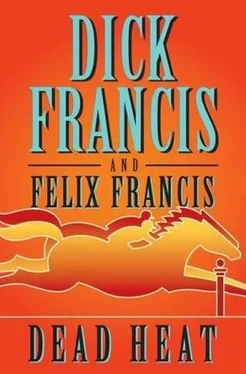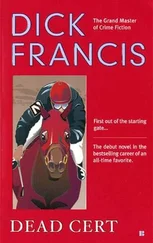He looked me up and down. I must have been quite a sight. I still wore my chef’s tunic, but my black-and-white checked trousers now had one leg long and one short, with a blue knee brace and white stocking below.
“Are you some sort of clown?” asked the driver.
“No,” I said, “I’m a chef.”
He lost interest.
“Where to?” he asked.
“Newmarket.”
THE TAXI ARRIVED at my cottage on the southern edge of Newmarket at about eleven o’clock. I had slept the whole way from Bedford Hospital, and the driver had real difficulty waking me up to get me out of the vehicle. Eventually, I was roused sufficiently for him to help me hop across the small stretch of grass between the road and my front door.
“Will you be OK?” he asked as I put the key in the lock.
“Fine,” I said, and he drove away.
I hopped into the kitchen and took a couple of the painkillers with some water from the sink tap. The stairs were too much, I decided, so I lay down on the sofa in my tiny sitting room and went eagerly back to my slumbers.
I was lying on a hospital gurney that was moving slowly along a gray-colored, windowless corridor. I could see the ceiling lights passing overhead. They were bright rectangular panels set into the gray ceiling. The corridor seemed to go on forever, and the lights were all the same one after the other, one after the other. I looked up and back to see that I was being pushed by a lady in a red chiffon blouse with a mass of curly hair bouncing on her shoulders. It was MaryLou Fordham, and she was smiling at me. I looked down at her lovely legs, but she didn’t have any legs and seemed to be floating across the gray floor. I sat up with a jerk and looked at my own legs. The bedding was flat where my legs should have been, and there was blood, lots of blood, bright red pools of blood. I screamed and rolled off the gurney. I was falling, falling, falling…
I woke up with a start, my heart pounding, my face cold, clammy, sweaty. So vivid had been the dream that I had to feel with my hands to be sure that my legs were actually there. I lay in the dark, breathing hard, while my pulse returned to something near normal.
It was the first of a repeating pattern.
Two disturbed nights in a row left me totally exhausted.
I SPENT MOST of Sunday morning lying down, first on the sofa and then on the floor, which was more comfortable. I watched the twenty-four-hour news channels to find out more about what was being dubbed “Terror at the Guineas.” There had been dozens of television cameras covering the races, but only one had, peripherally, captured the scene on the balcony Head On Grandstand box numbers 1 and 2 at the moment the bomb went off. The fleeting footage was played over and over again with every news bulletin. It showed a bright flash, with bits of glass, steel and concrete being flung outwards, along with bodies. Many of the Delafield Industries guests had been literally blown from the balcony, falling, rag doll like, onto the flat roof below and then onto the unsuspecting racegoers in the viewing areas below that. They, apparently, had been the lucky ones, injured but alive. It had been those inside the rooms, like MaryLou, who had suffered the worst.
I thought again about Robert and Louisa. I knew I should call someone to ask what had happened to them. I also knew that I didn’t want to make the call because I was afraid of the answer. I went on lying on the floor.
I discovered from the television that while I had been sitting obediently on my white plastic chair wrapped in my red blanket, there had been much activity at the racetrack. The police had moved in, en masse, and had taken the names and addresses of all the thousands in the crowd. I had somehow been missed.
The racing had been abandoned and the 2,000 Guineas had been declared void, as half the horses had stopped during the final furlong while others had been driven hard for the line, their jockeys concentrating so intently on the race that they were unaware of the explosion until they pulled up after the finish. The television pictures clearly showed how one young rider’s joy at winning his first Classic had quickly turned to despair as realization struck that he had won a race that wouldn’t be.
Speculation was rife as to who had caused such murder and why.
One television channel had a reporter situated near the Devil’s Dyke, with the racetrack clearly visible in the background, the front of boxes 1 and 2 now covered by a large blue tarpaulin. He claimed that a police source had indicated to him that the bomb may have struck the wrong target. The track manager, who was unavailable for comment due to ill health, had apparently confirmed to police that the occupants of box number 1 had been switched at the last minute. The reporter, who I thought was rather inappropriately dressed in an open-neck striped shirt with no jacket, went on to speculate that the real targets had been an Arab prince and his entourage who originally had been expected to be in box 1. The Middle East conflict has once again been brought to our shores, the reporter stated with confidence.
I wondered if MaryLou would feel better in the knowledge that she had lost her legs by mistake. I doubted it.
I called my mother, in case she was worrying about me.
She wasn’t.
“Hello, darling,” she trilled down the wire. “What an awful thing to have happened.”
“I was there,” I said.
“What, at the races?”
“No, I mean right there when the bomb exploded.”
“Really. How exciting,” she said. She didn’t seem the least bit concerned that I might have been killed.
“I am very lucky to be alive,” I said, hoping for some compassionate words from my parent.
“Of course you are, dear.”
Since my father died, my mother had become somewhat blasé about death. I think she really believed that whether one lived or died was preordained and out of one’s control. Recently, I thought that the collision with the brick truck had been, in my mother’s eyes, a neat way out of what was becoming a loveless marriage. Some time after his death, I had discovered that he had been having several minor affairs. Perhaps my mother believed that the accident was some sort of divine retribution.
“Well,” I said, “I thought I would let you know that I was OK.”
“Thank you, dear,” she said.
She didn’t ask me what had happened, and I decided not to share the horror. She enjoyed her quiet world of coffee mornings, church flower arranging and outings to visit well-tended gardens. Missing limbs and mutilated torsos didn’t have a place.
“Speak to you soon, Mum,” I said.
“Lovely, darling,” she said. “Bye.” She hung up.
We had never been very close.
As a child, it had always been to my father that I had gone for advice and affection. We had laughed together at my mother’s little foibles and joked about her political naivety. We had smiled and rolled our eyes when she had committed another faux pas, an all-too-regular occurrence.
I may not have actually cried when my father died, but I was devastated nevertheless. I worshipped him as my hero, and the loss was almost too much to bear. I remember clearly the feeling of despair when, a few weeks after his death, I could no longer smell him in the house. I had come home from boarding school for the weekend, and, suddenly, he wasn’t there anymore. The lack of his smell brought his demise into sharp reality-he wasn’t just out getting a newspaper, he was gone forever. I had rushed upstairs to his dressing room to smell his clothes. I had opened his wardrobes and drawers, and I had held his favorite sweaters to my nose. But he had gone. I had sat on the floor in that room for a very long time, just staring into space, totally bereft but unable to shed the tears, unable to properly grieve for his passing. Even now, I ached to be able to tell him about my life and my job, my joys and my sadnesses. I cursed him out loud for being dead and not being around when I needed him. I longed for him to be there to talk to, to soothe my hurting knee, to ease my troubled brain and to take away the horrors in my memory. But, still, I couldn’t cry for him.
Читать дальше












